To make home recovery a success, patients must feel 'confident' they are cared for: President Halimah
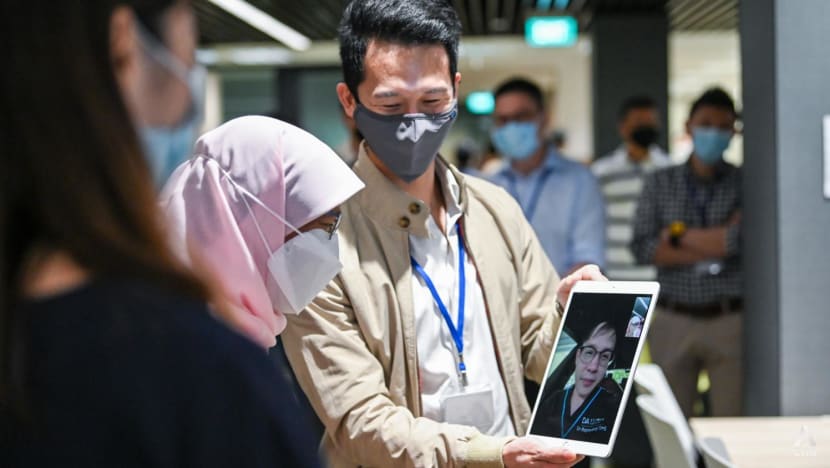
President Halimah Yacob speaking to a doctor through an iPad at the telemedicine centre with the Home Recovery Task Group on Nov 2, 2021. (Photo: Hanidah Amin)
SINGAPORE: It is vital for people to feel "confident that their interests are taken care of", in order to make the home recovery programme a success, said President Halimah Yacob during a visit to the Home Recovery Task Group headquarters on Tuesday (Nov 2).
She spoke to reporters about the importance of having smooth operations in the call centre and planning centre, and acknowledged the efforts behind the scenes in Singapore's fight against COVID-19.
Home recovery has been the default mode of care since Sep 15 for COVID-19 patients with mild or no symptoms. On average, about 70 per cent of those infected daily are recovering at home.
A few groups of patients are excluded from home recovery, such as unvaccinated or partially vaccinated people aged 50 and above, vaccinated people aged 80 and above, as well as children below one year old.
Home recovery buddies, who include full-time Singapore Armed Forces (SAF) national servicemen and regulars, contact positive cases by phone to confirm their eligibility and formally include them in the programme, said the task group on Oct 27.
More than 450 SAF personnel have been deployed to support the home recovery programme so far.
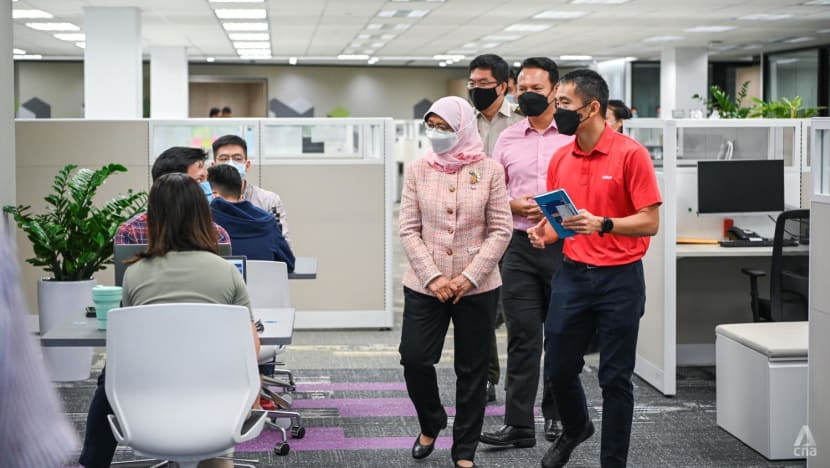
"A LOT OF WORK" BEHIND THE SCENES
There is "a lot of work which we don't see", including handling inbound and outbound calls as well as triaging, said Mdm Halimah.
She highlighted examples of people working behind the scenes to "make the system work", such as the SAF personnel, staff from agencies like the Ministry of Health and the Agency for Integrated Care, volunteers, and civil and public servants.
"Obviously with their skills and capabilities, they are able to do it quite quickly. So the ability to ramp it up so fast in response (to calls) ... their preparedness to on-the-ground issues is really very good," she said.
Moreover, SAF's unique strengths further enhance the home recovery programme, noted Mdm Halimah, describing them as "very well-organised, very well-trained". This would enable them to move "very fast".
"They have the competencies and skills to mobilise their resources at very short notice ... to help ameliorate the situation, help to put in place the needed platforms and needed facilities. I think that's really very helpful," she said.
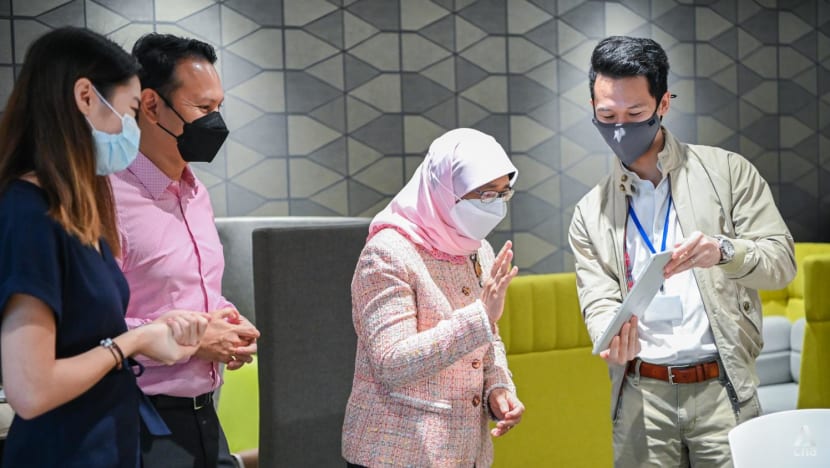
A lot of work also goes into following up and connecting patients to the relevant resources.
"For instance, for those who need the medical resources, they're connected to that. Those who need non-medical resources, social support, and so on, they are also connected to that. And of course, the telemedicine care, that is very critical," she said.
Telemedicine care is particularly important for patients who are at home and "don't feel so comfortable", added Mdm Halimah.
"When people are sick, they're very concerned about themselves. They want to get answers to their questions. When they reach out to somebody, they want to be able to reach that person quickly. So that's the kind of service and support that is provided, and it is very crucial."
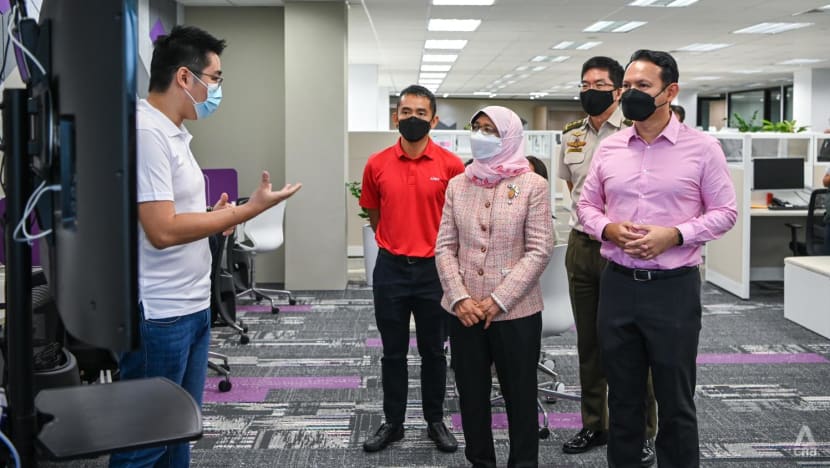
WORRIES “JUSTIFIED”
Mdm Halimah also empathised with the anxieties of those on the home recovery programme.
"I can fully understand how they feel because once you have COVID-19, they're worried. Not just for themselves, but also for their family members. They're worried they may be infecting them. But I just want to say that they are being properly taken care of, whether it's under home recovery or they go to hospital," she said.
"Whilst their worries are justified, as long as they follow protocols and the advice given, they should be all right."
Even though these concerns are "justified and necessary", they should remain "in context", she added.
"In my view, we have a very good system for home recovery. ... The context is that we do have a system to take care of them even when they are at home."
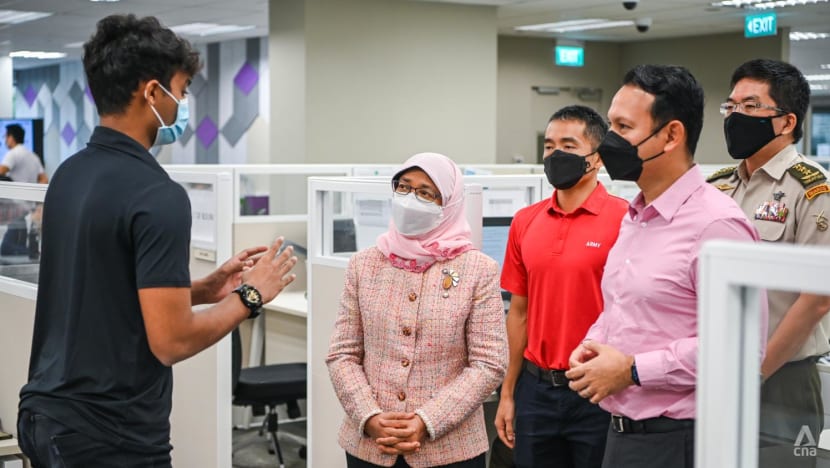
Mdm Halimah also said that even though Singapore will overcome the pandemic, "it will not be so soon".
She added that there are "different levels" of support to tide the country through in the meantime, such as getting vaccination and booster shots, doing antigen rapid tests (ART), and observing safe distancing measures.
"Vaccination is not the be all and end all, but vaccination at least protects you to some extent that you don't become very severely ill when you get infected. So I do want to say that, please, if you're not vaccinated, please do so. If you have not got your booster injections, go and get it," she said.
"Even countries with very high rates of vaccinations, we do see they have the third wave, their fourth waves. We will not be spared because we are part of the global situation. But together, I think individually, collectively, with government support, I'm quite confident we will be able to overcome this pandemic."
















